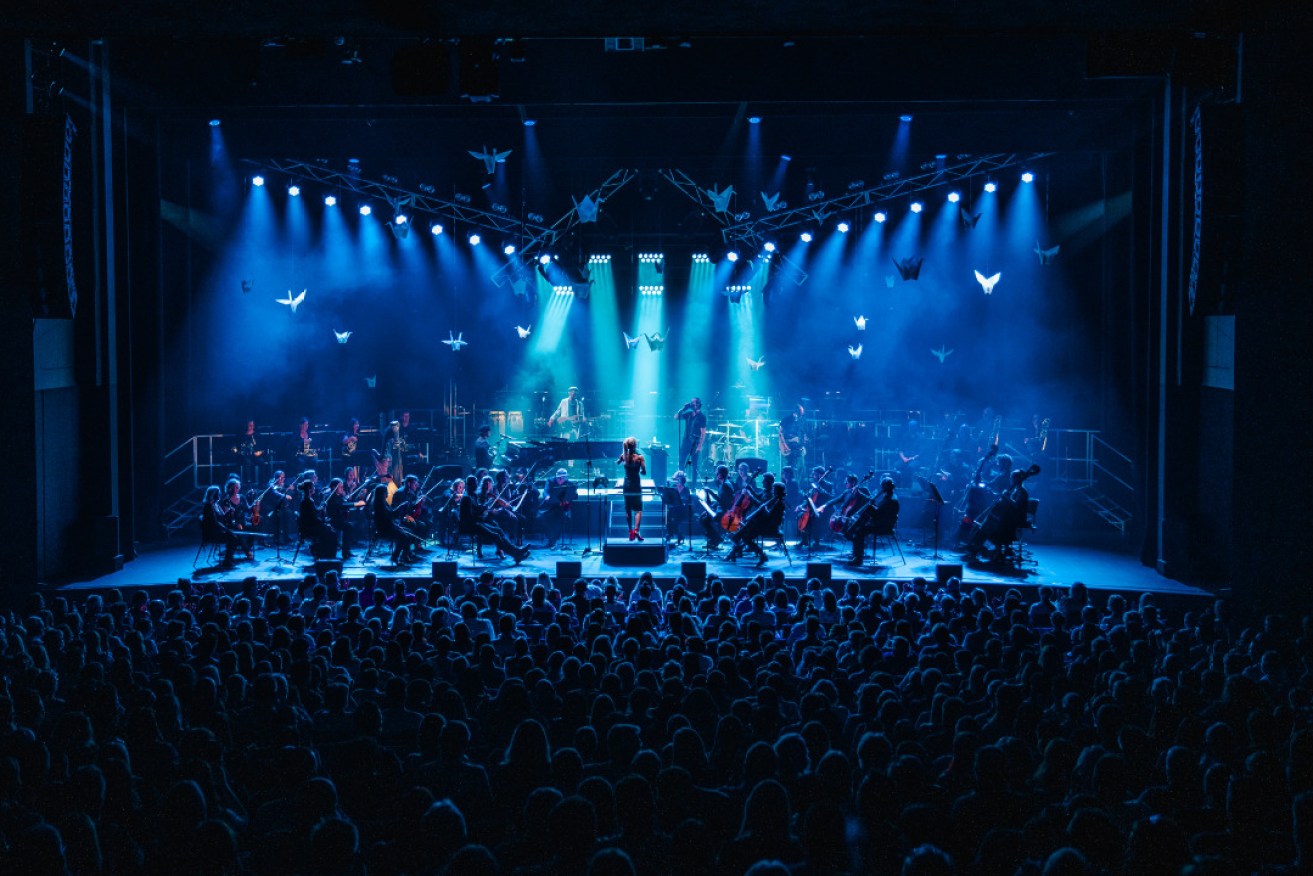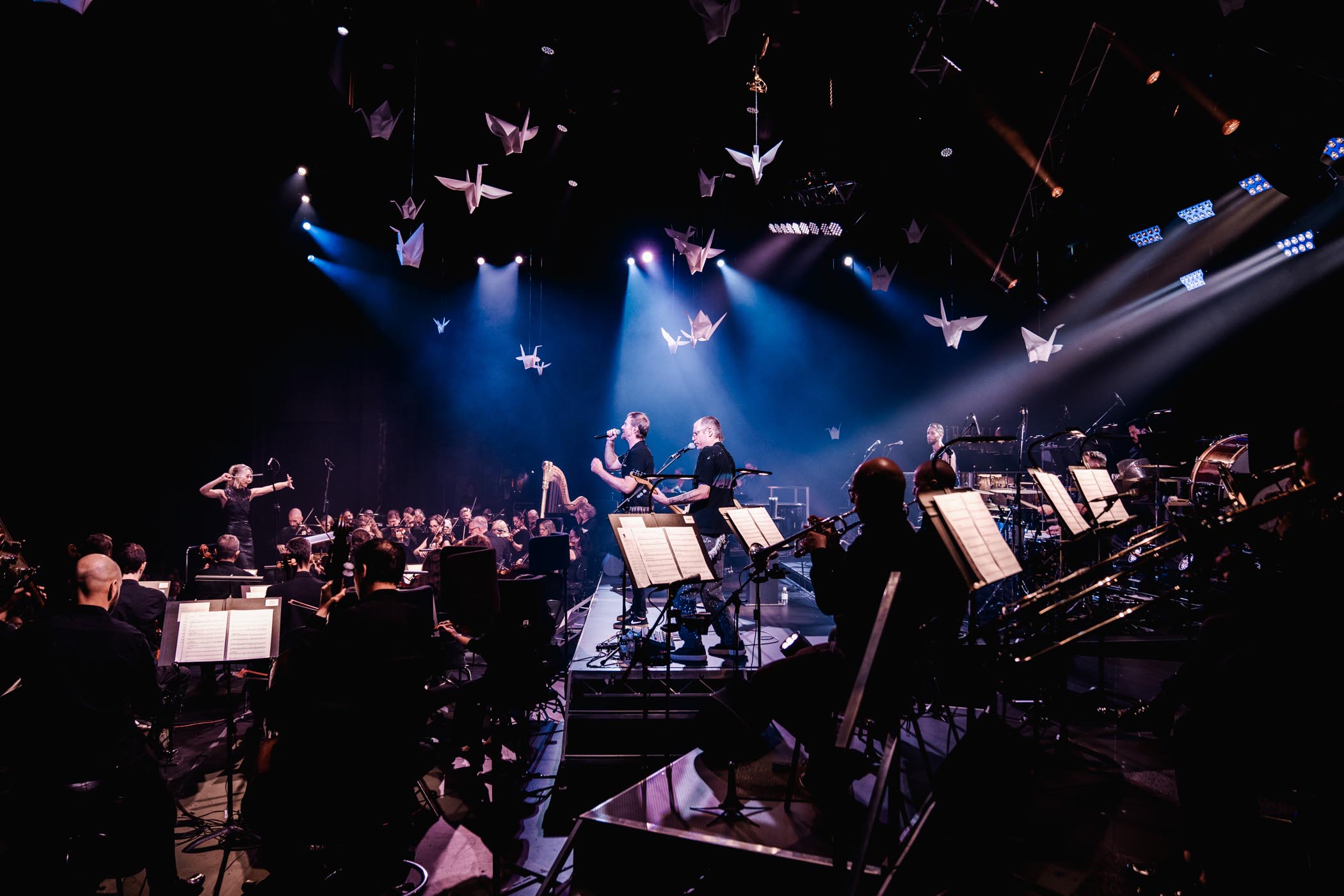Music review: Birds of Tokyo and the ASO present Birdsongs
The Adelaide Symphony Orchestra helps Birds of Tokyo soar, but is given too few chances to shine in the Adelaide leg of the Birdsongs tour.


The Birds of Tokyo with the ASO at the Festival Theatre. Photo: Saige Prime/supplied
In the telling of Birds of Tokyo lead vocalist, Ian Kenny, the process that led to the band’s current symphonic national tour, Birdsongs, began in 2008.
This was a Birds of Tokyo of a different era – before AFL Grand Final performances and ARIA wins. The Birds of Tokyo of 2008 wanted to move beyond the confines of its alt-rock label and try something new.
The evolution began with the band reaching out to composer Anthony Cormican, who reworked a selection of Birds of Tokyo’s back catalogue for accompaniment with string quartet and piano.
This collaboration became their 2009 Broken Strings tour, which was released as a live album in 2010, making it the band’s third major release.
It is also, Kenny told an Adelaide crowd on Thursday night, the base upon which Birdsongs is built.
This new version, though, is a much more ambitious production.
Rather than a quartet, the band is joined onstage for their two Adelaide shows at Festival Theatre by the Adelaide Symphony Orchestra.
Performing a score arranged by conductor Nicholas Buc (who did not make the trip for Birdsongs’s Adelaide dates), the ASO is led instead by Vanessa Scammell, who commands her troupe from front and centre of stage, standing opposite Kenny.
The musicians are bathed in blue light, with spotlights shining into the flock of paper cranes hung above the stage – a reference to Birds of Tokyo’s 2015 compilation album, Playlist.
The first set begins with ‘Broken Bones’, from the band’s 2008 album, Universes, and stays almost entirely within the first three studio releases (tracks like ‘Plans’, ‘Circles’, ‘Silhouettic’).
There are a few songs from Human Design, their most recent release from 2020, but this set is mostly a callback to a previous version of the band.
It’s a thrill to hear older Birds of Tokyo songs live for the first time in a long while, and in certain moments, with the orchestra swelling beneath the band, chills crawl up my neck.
I’m sure I wasn’t the only one to experience this nostalgia manifested – the room is full of people the right age to have been regular punters in 2008, many now with kids in tow – but, aside from gingerly clapping along to the opening bars of ‘Plans’, the crowd took a little while to find comfort in the seated, orchestral atmosphere.
By the second set, though, the audience had warmed up and were much more willing to voice their appreciation for the band. ‘Good Lord’ had the room in singalong mode, and by the end of the night much of the room was standing, waving smartphone torches in the air.
Latter-era Birds of Tokyo tracks trend towards the anthemic and there were plenty of these in the second set, many of which greatly benefited from backing by the orchestra.
‘The Greatest Mistakes’, ‘Two of Us’ and ‘This Fire’ all filled the cavernous theatre, becoming more than what could be achieved by Birds of Tokyo’s five members alone.
The promise of an orchestral rock collaboration stretches between two poles: either the music becomes heightened to cinematic levels, as in the iconic case of Metallica’s S&M, or the songs are stripped bare to reveal their complex structure, as Birds of Tokyo accomplished on Broken Strings.
Given Broken Strings already exists, one might hope that Birdsongs would be that former type of collaboration – a Gestalt melding of two disparate types of music to create something new and surprising.
For a lot of the show, though, the ASO does little more than offer a lush nest for Birds of Tokyo songs to sit within.
The arrangements, though creating broader soundscapes, melt into the mix of the rest of the band.
To not ask more of the large musical engine you’ve dragged onto stage with you is a shame.
It was most noticeable during ‘Silhouettic’, a 2008 track adapted for Birdsongs with its original frenetic pace slowed to a crawl and Kenny’s voice dropped below its natural tenor.
This nullified the two elements that made the original recording feel so urgent, with no new sense of urgency brought by the orchestra to fill the void.
The same can be said for the cover of Nine Inch Nails’ ‘Hurt’ (or the cover of Johnny Cash’s cover of the song, as Kenny describes it), which is pleasant enough but won’t stir any new emotions if you’re already familiar with the song.

Birdsongs, with the ASO and Birds of Tokyo. Photo: Saige Prime/supplied
Birdsongs does have high notes.
Kenny and the band, which is bassist Ian, Glenn Sarangapany on keys, Adam Spark on Guitar, and Adam Weston on drums, can often be found lilting among the melodies that float from the orchestra around them.
Their glee in being amongst the show they’ve created is infectious. Kenny appears to catch himself in awe at several moments throughout the show.
And Kenny, as always, is a powerhouse vocalist, but has now matured into his talent. He’s learned to control his breath, rather than drawing his trademark rasped yelping breaths between lyrics.
When the orchestra is given a clear directive to punch up a song, the results are incredible – such as in their interpretation of ‘Brace’, from the harder-edged 2016 record of the same name, which builds and builds like menacing doom.
‘Wild at Heart’, too, has the orchestra cooking, with the arrangement making the most of a late-song key change to sonically leap off a cliff.
It’s not that there isn’t a heightening of the material in Birdsongs, just that it’s less frequent than you might hope for.
But if all you need from a Birds of Tokyo gig is to be carried comfortably through a collection of songs that mean a lot to you, Birdsongs’s blend of classically trained restraint and rock ‘n’ roll abandon stills makes for an entertaining night.
Setlist
No overture
Broken Bones (Universes, 2008)
Plans (Birds of Tokyo, 2010)
Unbreakable (Invictus Games, 2018 + Human Design, 2020)
Circles (Birds of Tokyo, 2010)
Train Wrecks (Universes, 2008)
I’d Go With You Anywhere (Playlist, 2015)
My Darling My Son (Human Design, 2020)
Silhouettic (Universes, 2008)
Wild at Heart (Birds of Tokyo, 2010)
Never Going Back (Human Design, 2020)
–
Intermission
–
The Greatest Mistakes (Human Design, 2020)
Two Of Us (Human Design, 2020)
Anchor (Anchor EP, 2015)
Hurt (NIN cover)
This Fire (March Fires, 2013)
Mercy Arms (Brace, 2016)
Brace (Brace, 2016)
Good Lord (Human Design, 2020)
–
Encore
–
Lanterns (March Fires, 2013)
–
This article is republished from InReview under a Creative Commons licence. Read the original article.
InReview is an open access, non-profit arts and culture journalism project. Readers can support our work with a donation. Subscribe to InReview’s free weekly newsletter here.




